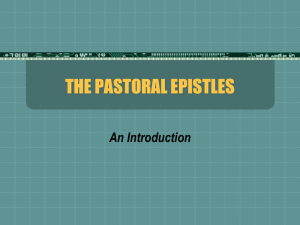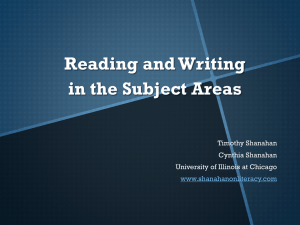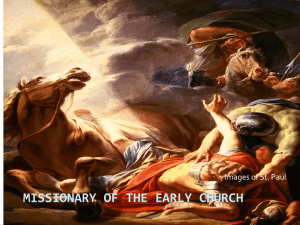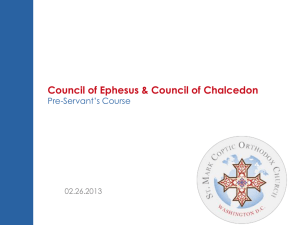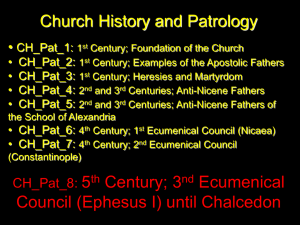I Timothy, Titus, II Timothy
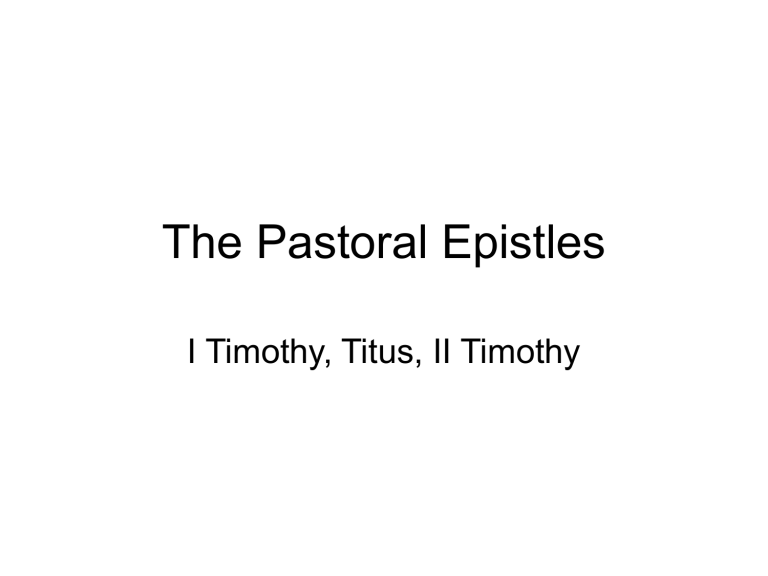
The Pastoral Epistles
I Timothy, Titus, II Timothy
• These three letters are called “Pastoral” because they are addressed to individuals working as “pastors” – ministers.
• Paul had left Timothy to work with the churches in Ephesus.
• Paul had left Titus to work with the churches on the island of Crete.
• The date of all three of these is uncertain because we don’t know where Paul was when he wrote them.
Timothy
• Paul met Timothy in Lystra on his first missionary tour.
• Timothy began traveling with Paul as he came through Lystra again on his 2 nd trip.
• His mother was Jewish and his father
Gentile.
• Paul had Timothy circumcised before he took him through Jewish communities.
• Paul called him “my beloved and faithful child in the Lord” and “my loyal child in the faith” ( 1 Cor. 4:17; 1 Tim 1:2).
• Timothy is mentioned in the prescripts for 6 letters of Paul:
– 1 Thess., 2 Thess., 2 Cor., Philip., Philem., Col.
– He was with Paul when he wrote Rom. (16:21).
• Worked with Paul and Silas in Thessalonica and Corinth (probably in Philippi).
• Was with Paul in Ephesus
• Took the letters to Thessalonica, Corinth
• Timothy was the “trouble shooter” for Paul.
– Thessalonica, Corinth (after the painful visit
Paul sent Timothy back)
• Philippians 2:20, 22
“I have no one like him who will be genuinely concerned for your welfare. . . . Timothy’s worth you know, how like a son with a father he has served with me in the work of the gospel.”
1 Timothy
• At some point Paul left Timothy in
Ephesus to work with the churches.
• He wrote to him to encourage him in the struggles that Paul knew he was having.
• Paul had worked there for 3 years and knew the community and churches well.
• Date and location
– Paul left Timothy in Ephesus while he went to
Macedonia.
– No mention in Acts or Paul’s letters when he could have done this.
– Possibly during the third missionary journey, except that Timothy is going back and forth between Ephesus & Corinth.
– Maybe when Paul went to Corinth, Tim went to
Ephesus?
– Possibly after his release from prison in Rome.
Main Themes of 1 Timothy
• Warnings about false teachers
• Emphasize love, conscience, faith in teaching.
• Encourage people to live faithful and moral lives.
• Discusses qualities and responsibilities of leaders (elders, deacons).
• Timothy is to focus on “sound (healthy) teaching” as he instructs people (4:6)
– Godliness
– Let no one despise your youth (4:12)
– Set an example for others in your speech, conduct, love, faith, and purity.
• Pay particular attention to widows.
• The church is to support them.
• Another warning about the effects of the false teaching.
– Leads to envy, dissension, slander, base suspicions, etc.
– Timothy is to pursue righteousness, godliness, faith, love, endurance, gentleness.
– Don’t let ministry make you bitter or unfaithful.
• Paul’s final words:
– “Timothy, guard what has been entrusted to you.”
Authorship
• Many do not accept Pauline authorship of the pastoral epistles for several reasons.
– Unusual vocabulary; hapax legomena
– Framework of Paul’s ministry
– Church order
– Argumentative strategy
– Theology
(Categories from DeSilva, An Introduction to the New Testament, 736ff.)
Titus
• Titus was Greek; not sure where his home was.
• He worked with Paul and Timothy in
Ephesus, Macedonia, and Achaia.
• He took the “sorrowful letter” to Corinth and brought good news to Paul in
Macedonia.
• Helped Paul with the collection for
Jerusalem Christians. (2 Cor. 8:6)
• At some point Paul went to Crete and left
Titus there to continue the work they began.
• This is not mentioned by Luke in Acts or in any other letters of Paul.
• Possibly during Paul’s 3 year ministry in
Ephesus.
• Possibly after release from prison in Rome.
Crete
• Very difficult place to work.
• Very rough place
• It had a long standing reputation:
– “Cretans are always liars, vicious brutes, lazy gluttons.”
– Paul (Titus 1:12, quoting Epimenides of Crete, 600
BC)
– Pirates would use Crete as a place to hide from the
Romans; the Cretans welcomed them.
Themes in Titus
• Godliness that leads to “sound” and productive lives.
• Titus was to appoint elders in each city.
• “Healthy (sound) teaching”
– Older men
• Temperance, prudence, sound faith, love, endurance
– Older women
• Reverent in behavior
• No slandering
• Not be a slave to drink
• Teach what is good
• Encourage younger women to love their husbands, their children, be self-controlled, good managers of the household, etc.
– Younger men
• Be self-controlled
– Titus
• Be a model of good works
• Integrity, gravity, sound speech
– Slaves
• Be submissive to masters
• Don’t steal
• Show complete fidelity in your work
• General teachings
– Be subject to rulers
– Be ready for every good work
– Speak evil of no one
• Remind people to be careful to devote themselves to good works
• Avoid stupid controversies, etc.
• Let people learn to devote themselves to good works in order to meet urgent needs, so they may not be unproductive.
2 Timothy
• Paul is in prison, most likely Rome.
• Timothy evidently still or back in Ephesus.
• Paul is more reminiscent, seems to feel that his end is near.
• Perhaps while in Rome, after his earlier release.
• Writing to encourage Timothy in his ministry.
• Paul is not optimistic about the possibility of a release (cf. Philip. and Phm).
• Paul reflects back over his ministry .
– 4:7 “I have fought the good fight . . .”
– He has a good conscience about serving the
Lord well and is looking forward to being with the Lord.
• He knows Timothy well and compliments him and his family background.
• Paul reflects on his own sufferings and what he has learned about depending on the Lord.
• He knows Timothy is in a difficult place,
Ephesus, so he encourages him to remain faithful.
Specific Instructions
• Be a good worker, faithful.
• Maintain your own purity.
• Be an example of righteousness, faith, love, peace.
• Avoid useless arguments.
• Devote yourself to studying and teaching.
• Follow through with your commitment, in spite of the problems and challenges.
Where in Paul’s Ministry?
• Neither Acts nor Paul gives us enough information to determine for sure when
Paul wrote these letters.
• He could have written 1 Timothy from
Macedonia after he had left Ephesus on his way to Corinth
– He had sent Titus ahead; perhaps he left
Timothy in Ephesus.
• At some point he and Titus worked together on the island of Crete.
• This could have been during his stay in
Ephesus.
• It could also have been after Paul was released from his Roman imprisonment.
– Paul may have gone to Crete at that point either before or after he went to Spain.
• 2 Timothy was probably written from prison in Rome after he had traveled to
Spain.
• Tradition (not the NT) indicates that Paul did make it to Spain and that later he was executed during Nero’s persecution around 64-65.
– Clement of Rome (ca. 96) – “having reached the limit of the west.” (1 Clement 5:1-7;
Clement was writing from Rome)
